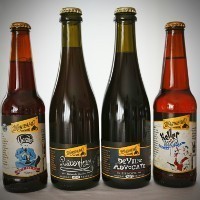

A small craft brewery based in Sydney has emerged victorious in a costly two-year trademark battle with multinational beer giant SABMiller.
In a David-and-Goliath type battle, Wayward Brewing has this week won the right to trademark the name Wayward for beer in Australia, two years after SABMiller India first objected to the small business’ bid to register the name in the local beer market.
Peter Philip, founder and head brewer at Wayward Brewing, told SmartCompany this morning he shelled out more than $25,000 over the two years in his battle to be able to trademark the Wayward name. Although the Australian Trade Marks Office has ordered SABMiller to pay costs to Philip, he says this will amount to just $2,500 at best.
“In direct costs, it has amounted to $25,000, with my legal fees around $15,000,” says Philip. “That’s not to mention the hundreds and hundreds of hours I have spent researching for the case, and you can’t put a price on the sleepless nights.”
More importantly, Philip was forced to essentially put his business on hold for the two years.
“It really held us back,” he says. “While the objection does not formally stop you from doing business, we’ve only been producing under 50,000 litres of beer a year.”
“We’ve been successful at a number of beer festivals and we sell to pubs, so we know people like the product. But we didn’t want to invest hundreds of thousands of dollars to build something we wouldn’t be allowed to use.”
Philip first started brewing his beer more than two years ago, and says he put in considerable effort choosing a brand name and checking whether his chosen name was registered by someone else in Australia.
“We thought we were doing the right thing and we went through quite an extensive process of finding a name,” says Philip.
“The Wayward name was available here and in the US and Canada and it really resonated with what we wanted to do with the business. We wanted to be a bit different from others and the name reflects our brewing style.”
Philip registered the name and it was accepted by the trademark office in 2012, but he says SABMiller India registered an objection to the name in February 2013.
“We had done a lot of due diligence so we were surprised,” says Philip. “The frustrating thing is that when an objection is lodged, the business does not actually need to say why they are objecting. They have a period of six months to actually file their evidence that there is a breach of trademark.”
Philip says SABMiller objected to the Wayward name on every possible grounds, arguing the name Wayward could be confused with the name of one of its beer brands, Haywards.
For his part, Philip says he had never heard of the Haywards beer brand, and it appears the product is imported into Australia in small quantities. And he says SABMiller does not have a trademark registered for Haywards in the Australian market.
“If you compare our logo and branding, I don’t believe any person could be confused,” says Philip. “I just don’t think it’s possible.”
Finlaysons intellectual property, media and technology partner John MacPhail agrees, telling SmartCompany this morning the word ‘wayward’ is commonly used in the English language and it has a distinct meaning. It is therefore unlikely to be confused with a surname such as Haywards.
MacPhail says companies have the right to object to a trademark bid if it is exactly the same as their trademark, or if it is not the same, it is so close to it that it would cause confusion.
However, the trade mark office will usually apply the rule of thumb that in the case of a single word trademark, if the word starts with a different letter, it is probably not too similar and will usually have a “different concept and feel”.
For this reason, MacPhail says the decision in favour of Wayward Brewing is “not too controversial”. “Reading between the lines, you’ve got to conclude SABMiller India ran this case very light. They didn’t put all their resources into it.”
“You would think a very large brand-driven multinational like this would have all its ducks in position if it was concerned about going into a market,” he says.
As for Philip, he says he was “always pretty confident” he could triumph over his brewing counterpart, as long as he didn’t run out of money in the process.
“The challenge was trying to do this and stay afloat and not lose our house,” he says. “I didn’t want to give up without a fight. I would have been really sad if we had of lost. It would have been all that money for nothing.”
SmartCompany attempted to contact SABMiller and SABMiller India but did not receive a response prior to publication.


COMMENTS
SmartCompany is committed to hosting lively discussions. Help us keep the conversation useful, interesting and welcoming. We aim to publish comments quickly in the interest of promoting robust conversation, but we’re a small team and we deploy filters to protect against legal risk. Occasionally your comment may be held up while it is being reviewed, but we’re working as fast as we can to keep the conversation rolling.
The SmartCompany comment section is members-only content. Please subscribe to leave a comment.
The SmartCompany comment section is members-only content. Please login to leave a comment.